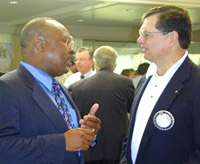|
|

Ken Bunting chats with Norm Johnson at the conclusion of the 7/21 meeting.
|
The Seattle metro market has always been a competitive place. For years, the Seattle Times and Seattle Post-Intelligencer competed in their own separate worlds, the P-I with the
morning paper, the Times in the afternoon. Even when the two papers merged in a Joint Operating Agreement to conserve on costs and reduce the necessity of operating two publishing
plants, the two papers maintained their personalities.
Now, however, the face of competition has changed. On March 6, 2000, the Seattle Times closed down their afternoon edition and began publishing only in the morning, in direct competition to the P-I.
Ken Bunting, Executive Editor of the P-I, visited the BBRC exclaiming, “I love competition, and competitive newspaper markets.” He must be ecstatic!
Kenneth F. Bunting, Executive Editor of the Seattle Post-Intelligencer, was named to that post in January 2000, after seven years as the
newspaper’s Managing Editor. He has responsibility for all news and feature content of the newspaper and its online complement, Seattlep-i
.com. Bunting is also on the Executive Committee and the Editorial Board of the newspaper, which is a unit of the Hearst Corporation. The P-I, as it
is known locally, serves a diverse and expanding four-county market of more than three million people.
Before joining the Post-Intelligencer, Bunting was with the Fort Worth Star-Telegram, where he had been State Capitol Bureau Chief, City
Editor, Assistant Managing Editor, Deputy Managing Editor ,and finally Senior Editor.
During a newspaper career nearing the end of its third decade, he has also gathered news, written, and edited for the Los Angeles Times, the San Antonio Express-News, the Cincinnati Post, the Sacramento Bee, and
the Corpus Christi (TX) Caller-Times, where he held his first full-time job in newspapering.
A Texas native, Bunting graduated from Texas Christian University in 1970, with a Bachelor of Arts degree in journalism and history. He also
attended the University of Missouri, Lee College, and Salmon P. Chase College of Law at Northern Kentucky University, and completed the Advanced Executive Program at Northwestern University’s Kellogg
School of Business.
He serves on numerous boards, and is active in civic and community affairs, as well as professional associations. Bunting and his wife, Juliana
Amy Jafvert Bunting, also a journalist, have a son, Maxwell Freeman Bunting, who is eight.
Bunting’s visit corresponded with the culmination of a 15-month project, where the P-I has undergone a major re-design. For those who subscribe,
you’ll see the paper has an emphasis on bigger pictures, a Digest on page 2 with a summary of about 20 stories daily for the reader who has
limited time, a TV page with information covering 73 channels [up from 26], and an expanded weather page linked to their website, www.seattlep-i.com.
“We recognize the rapid coverage of news by the electronic media. While we maintain our vigilance as a newspaper committed to being authoritative
, reliable, and trustworthy, we know we must offer continued in-depth coverage of the news with fairness and accuracy,” Bunting said.
The P-I recently covered a story in the Western Montana town of Libby, where an asbestos mine operated. Over the years, nearly 200 people have
died from the effects of working and living near the facility, while many more are ill with asbestosis poisoning. Until the paper brought the story to
light, various governmental and health agencies had overlooked the problem. Today, the story has gone nationwide, embracing other communities where mining and manufacturing using toxic materials has
adversely affected significant populations.
Bunting said that in the face of this new competition, newspaper circulation has dropped. Latest figures show both major dailies losing – the P-I down 4%, the Times down 5.5%. Only time will tell what may come of this head
-to-head competition.
Thanks to Norm Johnson for his introduction.
|

